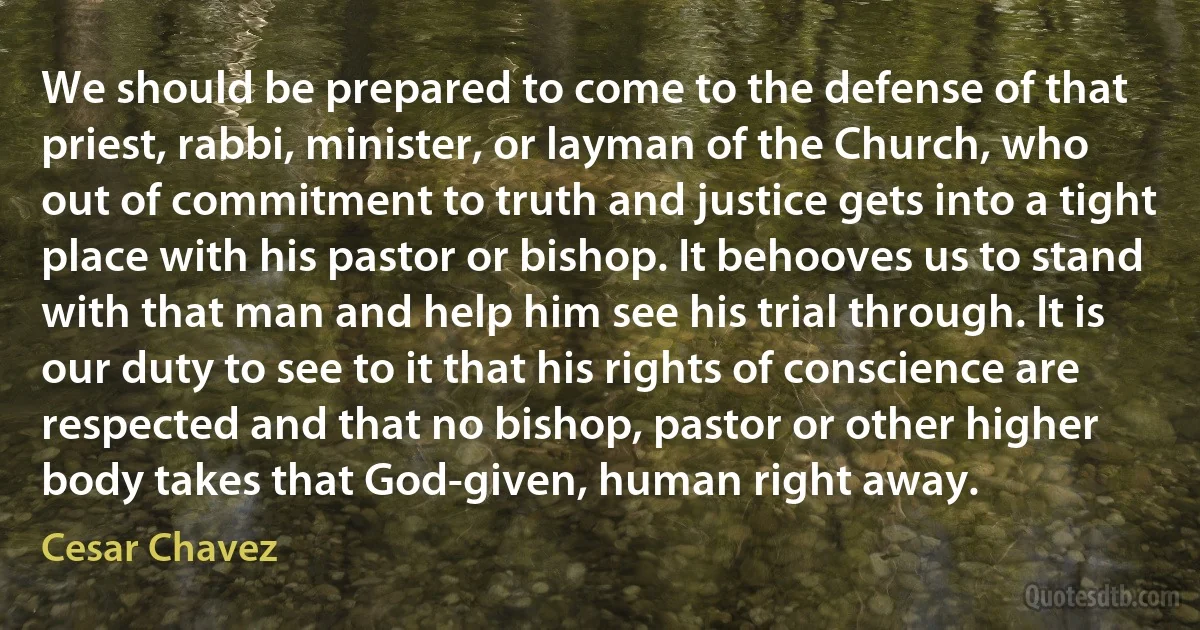Bishop Quotes - page 2
In Hilary Term 1636, 7. I took the Degree of Batchelor of Arts; and in 1640, the Degree of Master of Arts, and then left Emanuel College; and the same year I entered into Holy Orders, ordained by Bishop Curle, then Bishop of Winchester. I then lived a Chaplain for about a year, in the house of Sr. Richard Darley, (an antient worthy Knight,) at Buttercramb in Yorkshire, and then, for two years more, with the Lady Vere, (the Widdow of the Lord Horatio Vere,) partly in London, and partly at Castlc-Hedingham in Essex, the antient seat of the Earls of Oxford.

John Wallis
And that's when things get messy. When people begin moving beyond charity and toward justice and solidarity with the poor and oppressed, as Jesus did, they get in trouble. Once we are actually friends with the folks in struggle, we start to ask why people are poor, which is never as popular as giving to charity. One of my friends has a shirt marked with the words of late Catholic bishop Dom Helder Camara: "When I fed the hungry, they called me a saint. When I asked why people are hungry, they called me a communist.” Charity wins awards and applause but joining the poor gets you killed. People do not get crucified for living out of love that disrupts the social order that calls forth a new world. People are not crucified for helping poor people. People are crucified for joining them.

Shane Claiborne
They tell me every day is there
Not more nor less than Sunday gay;
In shining robes and garments fair
The people walk upon their way.
One gazes there on castle walls
As grand as those of Babylon,
A bishop and two generals!
What joy to be in Carcassonne!
Ah! might I but see Carcassonne!

Gustave Nadaud
Needless to deny that the normal London plumber is a dishonest man. We do not even allow ourselves to think so. That question, as to the dishonesty of mankind generally, is one that disturbs us greatly; - whether a man in all grades of life will by degrees train his honesty to suit his own book, so that the course of life which he shall bring himself to regard as soundly honest shall, if known to his neighbours, subject him to their reproof. We own to a doubt whether the honesty of a bishop would shine bright as the morning star to the submissive ladies who now worship him, if the theory of life upon which he lives were understood by them in all its bearings.

Anthony Trollope
But your Squabbles about a Bishop I wish to see speedily ended. ... Each Party abuses the other, the Profane and the Infidel believe both sides, and enjoy the Fray; the Reputation of Religion in general suffers, and its enemies are ready to say, not what was said in the primitive Times, Behold how these Christians love one another, but, Mark how these Christians hate one another! Indeed when religious People quarrel about Religion, or hungry People about their Victuals, it looks as if they had not much of either among them.

Benjamin Franklin
Bishop Köyu said (it seems to me very admirably), 'It is only a person of poor understanding who wishes to arrange things in complete sets. It is incompleteness that is desirable.' In everything regularity is bad. To leave a thing unfinished gives interest, and makes for lengthened life. They say that even in building the [imperial] palace an unfinished place is always left. In the writings of the ancients, inner and outer [Buddhist and non-Buddhist], there are many missing chapters and parts.

Yoshida Kenkō
Behind her chair, from a wall covered in a very expensive velvet-flock paper, a portrait of her grandfather looked down. He had been an Episcopalian bishop, but the picture showed him in the costume of a New England gentleman keeping up the Old English custom of riding to hounds: red coat, brown boots, distinguished with a white dog-collar and black silk front.
Hugh referred to him as being dressed to kill.
The salad was replaced-though Hugh had sampled only a mouthful of his-by a dish of cold fish with mayonnaise. He didn't even touch this course. He was suddenly afraid of it because it had come from the sea.

John Brunner
If there was in all France, between 1140 and 1200, a more typical Englishman of the future Church of England type than John of Salisbury, he has left no trace; and John wrote a description of his time which makes a picturesque contrast with the picture painted by Abélard, his old master, of the century at its beginning. John weighed Abélard and the Schools against Bernard and the Cloister, and coolly concluded that the way to truth lay rather through Citeaux, which brought him to Chartres as Bishop in 1176, and to a mild scepticism in faith. "I prefer to doubt," he said, "rather than rashly define what is hidden."

Henry Adams
[T]he speaker with whom I was most struck, though I dissented from nearly every word he said, was Thirlwall, the historian, since Bishop of St. David's, then a Chancery barrister, unknown except by a high reputation for eloquence acquired at the Cambridge Union before the era of Austin and Macaulay. His speech was in answer to one of mine. Before he had uttered ten sentences, I set him down as the best speaker I had ever heard, and I have never since heard any one whom I placed above him.

John Stuart Mill
In the New Testament sense, to be a Christian is, in an upward sense, as different from being a man as, in a downward sense, to be a man is different from being a beast. A Christian in the sense of the New Testament, although he stands suffering in the midst of life's reality, has yet become completely a stranger to this life; in the words of the Scripture and also of the Collects (which still are read-O bloody satire!-by the sort of priests we now have, and in the ears of the sort of Christians that now live) he is a stranger and a pilgrim-just think, for example of the late Bishop Mynster intoning, "We are strangers and pilgrims in this world”! A Christian in the New Testament sense is literally a stranger and a pilgrim, he feels himself a stranger, and everyone involuntarily feels that this man is a stranger to him.

Søren Kierkegaard
You get somebody to explain the Trinity to you, they'll say "Well God, he's God, and Jesus is God as well, and the Holy Spirit is... [mumbles indistinctly]". "What?" "He's the fecund spirit of the Lord who impregnates Mary, then gets a bit up himself and is reduced to light clerical duties?" Let's examine that in joke form: three male divine natures go into a cosmic essence, giving and receiving love, but not in a gay bishop way, to which the whole of Islam goes "Wha?"; Hinduism: "Nah!"; or Buddhism: "Ssh!".

Bill Bailey



